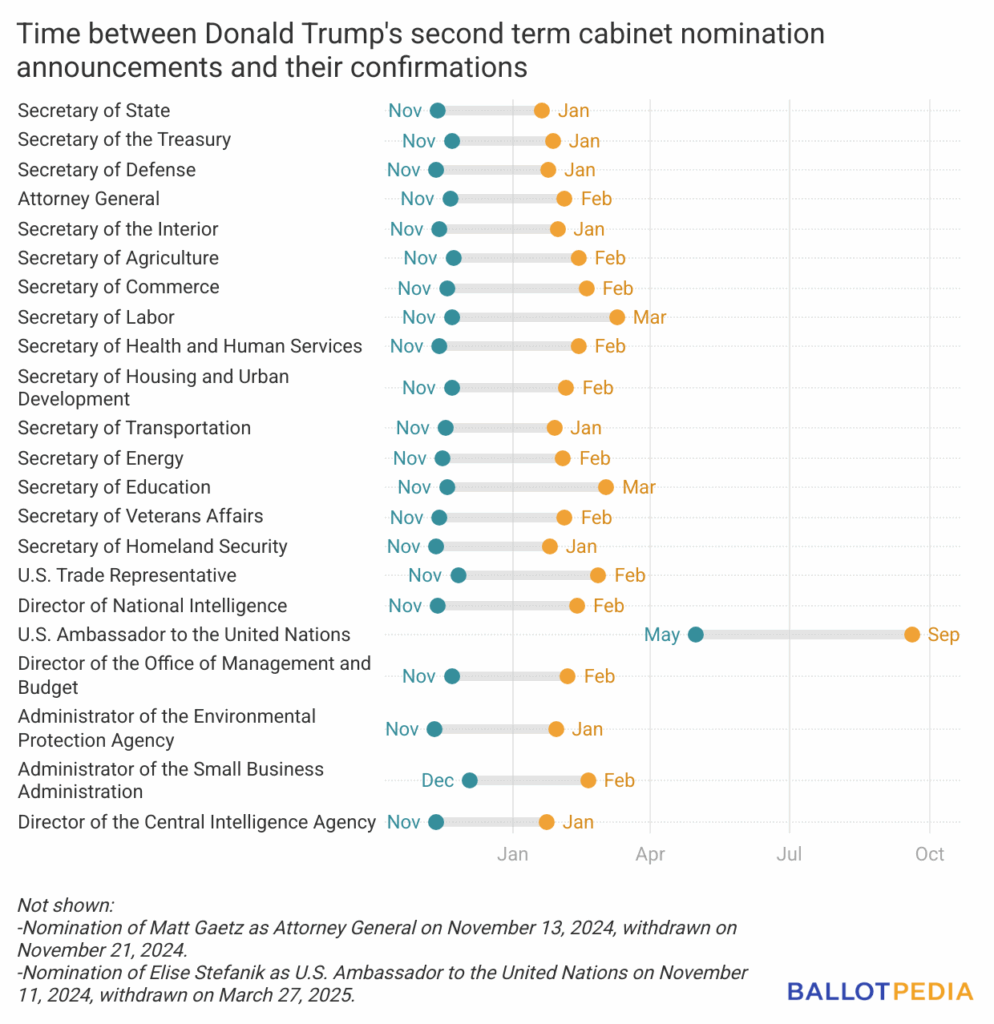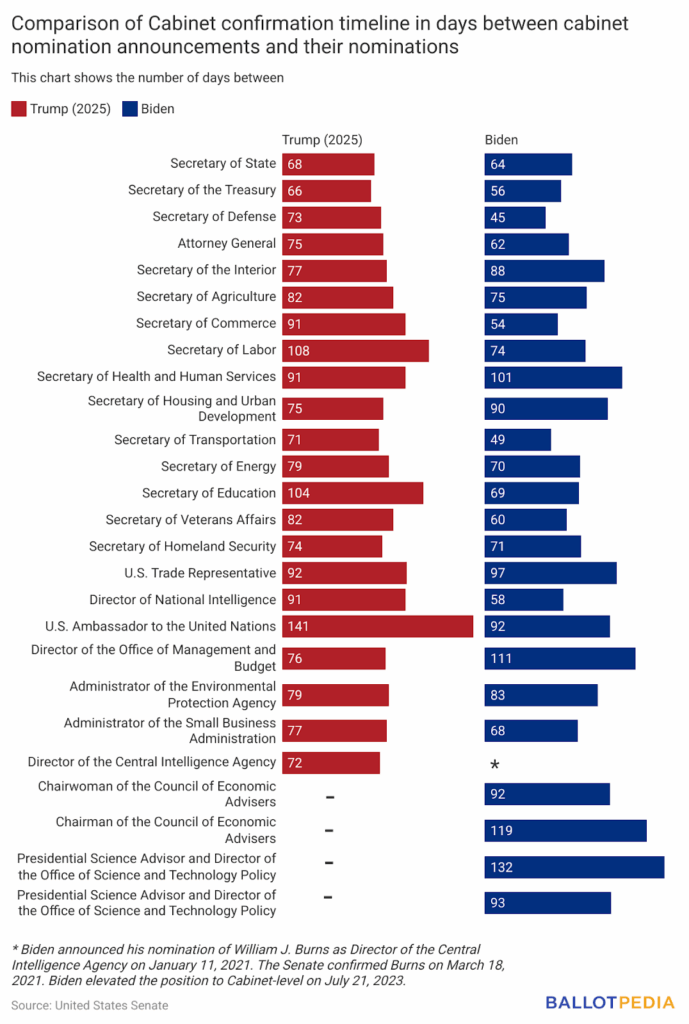Daily Brew: September 24, 2025
Welcome to the Wednesday, Sept. 24, 2025, Brew.
By: Lara Bonatesta
Here’s what’s in store for you as you start your day:
- A look at the candidates, issues, and endorsements in Seattle’s Nov. 4 mayoral election
- Michael Waltz confirmed as U.S. ambassador to the United Nations
- EPA proposes ending emissions reporting
A look at the candidates, issues, and endorsements in Seattle’s Nov. 4 mayoral election
Incumbent Bruce Harrell and Katie Wilson are running in the Nov. 4 general election for mayor of Seattle. In the Aug. 5 primary, Wilson and Harrell defeated six other candidates. Wilson received 50.8% of the vote, and Harrell received 41.2%.
While mayoral elections in Seattle are nonpartisan, both candidates are Democrats. Wilson has described herself as a progressive, and some media outlets have compared her to New York City mayoral candidate Zohran Mamdani. Local media outlets have described Harrell as a moderate, though he has also described his policies as progressive.
Following the primary, KOMO News political analyst and Strategies 360 CEO Ron Dotzauer said he "believes the race will remain competitive, with messaging on cost of living, housing affordability, and public safety being crucial to Seattle voters." According to the official election results, turnout in the primary was 39.5%. In the August 2021 mayoral primary, turnout was 41.9%. In the November 2021 general election, turnout was 54.6%.
Harrell was first elected in 2021, when he defeated M. Lorena González 58.6%-41.2%. The last incumbent Seattle mayor to win re-election was Greg Nickels in 2005.
Wilson is the co-founder and executive director of the Seattle-based Transit Riders Union. Wilson's campaign website said, “The incumbent mayor has been a fixture in city hall since 2008. More people are sleeping unsheltered on our streets than ever before. Working families are struggling to stay afloat. We can do so much better. And as we face unprecedented national threats, we must do better.” Several local Democratic organizations, including the King County Democrats, and Seattle’s 34th, 36th, 37th, and 43rd District Democrats endorsed Wilson. The Transit Riders Union, PROTEC17, and the United Food and Commercial Workers Local 3000 also endorsed Wilson. As of Sept. 22, Wilson raised $791,000 and spent $490,000.
Before he was elected mayor, Harrell was a lawyer and a member of the Seattle City Council from 2008 to 2020. Harrell is running on his record. His campaign website said, “We’ve delivered public safety solutions, kept parks and sidewalks open and accessible while moving people into shelter and housing with services, made historic investments in affordable housing, prioritized a transportation system focused on safety, and passed nation-leading climate legislation. But there is more work to do – this is the time for proven leadership.” Former U.S. Secretary of Transportation Pete Buttigieg (D), Washington Gov. Bob Ferguson (D), Attorney General Nick Brown (D), U.S. Sen. Maria Cantwell (D), and U.S. Rep. Pramila Jayapal (D) endorsed Harrell. As of Sept. 22, Harrell raised $883,000 and spent $517,000.
On Sept. 11, City Inside/Out hosted a debate between Wilson and Harrell. During the debate, the candidates discussed housing, public safety, the city budget, and the mayor's role in responding to the Trump Administration’s policies.
One issue the candidates differed on was funding for the city's new social housing developer, a public development authority created to develop, own, and maintain social housing in Seattle. On Feb. 11, Seattle voters approved Proposition 1A, a citizen initiative that established a new tax on payroll expenses to fund the social housing developer.
During the debate, Wilson said, "Seattle voters have twice told us now overwhelmingly that they want the city to build permanently-affordable, publicly-owned, mixed-income housing. ...We need city leadership that's going to fight to make it work. And Harrell … has done nothing but try to undermine that project."
Harrell said, "We have supported social housing corporation from the beginning. The only issue was how can it be funded. ... We wanted it to be funded in the existing payroll expense tax because we need those businesses to stay in Seattle."
Another topic the candidates differed on was the proposed use of CCTV surveillance technology in the city, which Harrell supports and Wilson opposes.
Wilson said, “The necessity of fighting Trump and protecting our immigrant and refugee communities and other vulnerable communities is exactly why I have grave concerns about the CCTV surveillance legislation, which our mayor supports and has transmitted to council. Because that proposal is to greatly increase the cameras around our city at a very sensitive time.”
Harrell said, “People of color and people from immigrants and refugees communities … are asking me for tools to become safe. We will address all of the concerns about federal overreach… I will never allow my community to be over-surveilled by government technology. The safeguards are in place… and I will issue another executive order to assure those people that have concerns that their issues are addressed.”
Seattle is also holding elections for city attorney and city council on Nov. 4. Twenty-seven of the 100 most populous U.S. cities, including Seattle, are holding mayoral elections this year. As of September, 66 of these cities have Democratic mayors, 23 have Republican mayors, one has a Libertarian mayor, three have independent mayors, and five have nonpartisan mayors. Two mayors' partisan affiliations are unknown.
Click here to see our full coverage of the Seattle mayoral election, and click here to see our Aug. 7 episode of On the Ballot.
Michael Waltz confirmed as U.S. ambassador to the United Nations
On Sept. 19, the U.S. Senate voted 47-43 to confirm the final member of President Donald Trump's (R) second-term cabinet: Michael Waltz as U.S. ambassador to the United Nations. Forty-four Republicans and three Democrats, Sens. John Fetterman (D-Pa.), Mark Kelly (D-Ariz.), and Jeanne Shaheen (D-N.H.), voted in favor. Forty-one Democrats voted against the nomination, as did Sen. Angus King (I-Maine), and Republican Sen. Rand Paul (R-Ky.).
Trump announced Waltz’s nomination on May 1. Waltz was his second nominee for the position, following Trump’s initial nomination of Rep. Elise Stefanik (R-N.Y.) in November 2024. Trump withdrew Stefanik’s nomination in March 2025.
All other members of Trump's cabinet were confirmed by March 10. Waltz’s confirmation on Sept. 9 was 141 days after Trump nominated him. Other than Waltz, the longest periods of time between Trump’s nominations and their confirmations were 108 days (Lori Chavez-DeRemer, Secretary of Labor) and 104 days (Linda McMahon, Secretary of Education). The Senate confirmed Chavez-DeRemer on March 10 and McMahon on March 3. The Senate confirmed all other cabinet members in January and February.

In addition to the 15 cabinet positions noted in federal law as part of the presidential line of succession, presidents sometimes elevate other agency heads to be members of the cabinet. In Donald Trump’s second term, the following offices have been given cabinet rank:
- White House chief of staff
- Administrator of the Environmental Protection Agency
- Director of the Office of Management and Budget
- U.S. trade representative
- Director of the Central Intelligence Agency
- Director of National Intelligence
- Administrator of the Small Business Administration
- Ambassador to the United Nations
Click on the following links to learn more about the timelines of cabinet confirmations during Trump’s first term and Joe Biden’s (D) presidency.
The average time between Trump’s second-term cabinet nomination announcements and their confirmations was 84 days. During Biden’s presidency, the average was 79 days.

Click here to learn more about the confirmation process for Trump’s cabinet.
EPA proposes ending emissions reporting
On Sept. 13, the Environmental Protection Agency (EPA) published a proposed rule that would eliminate the Greenhouse Gas Reporting Program (GHGRP), which requires fossil fuel producers to disclose carbon emissions. Administrator Lee Zeldin said the reporting program goes beyond what the Clean Air Act requires.
Zeldin says the change could save businesses an estimated $2.4 billion annually and will not harm air quality. Former Biden administration EPA official Joseph Goffman said the move “blinds Americans to the facts about climate pollution. Without it, policymakers, businesses and communities cannot make sound decisions about how to cut emissions and protect public health.”
The EPA launched the GHGRP during the Obama administration in 2009 to collect annual emissions data from large emitters. The EPA created the program under its Clean Air Act authority, which directs the agency to regulate air pollution.
The proposed rule comes as other federal climate disclosure rules face uncertainty. Business groups and Republican attorneys general are challenging Securities and Exchange Commission (SEC) rules adopted in 2024 during the Biden administration that require public companies to disclose climate risks. In July 2025, the SEC told the Eighth Circuit it would not defend the rules and did not say whether it would enforce them if upheld.Ballotpedia covers support for and opposition to environmental, social, and corporate governance (ESG) investing. To learn more about arguments for, against, and about ESG, click here. For more information on reform proposals related to ESG policy, click here.



